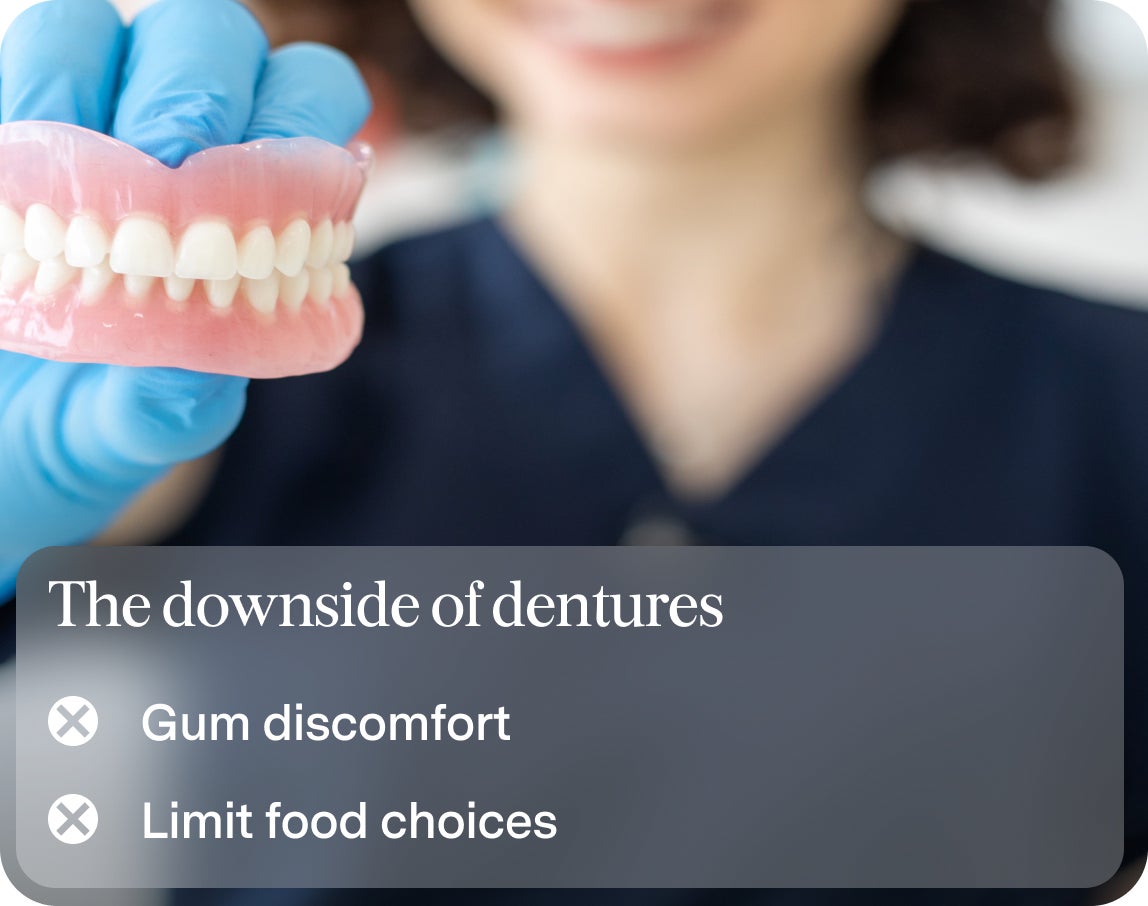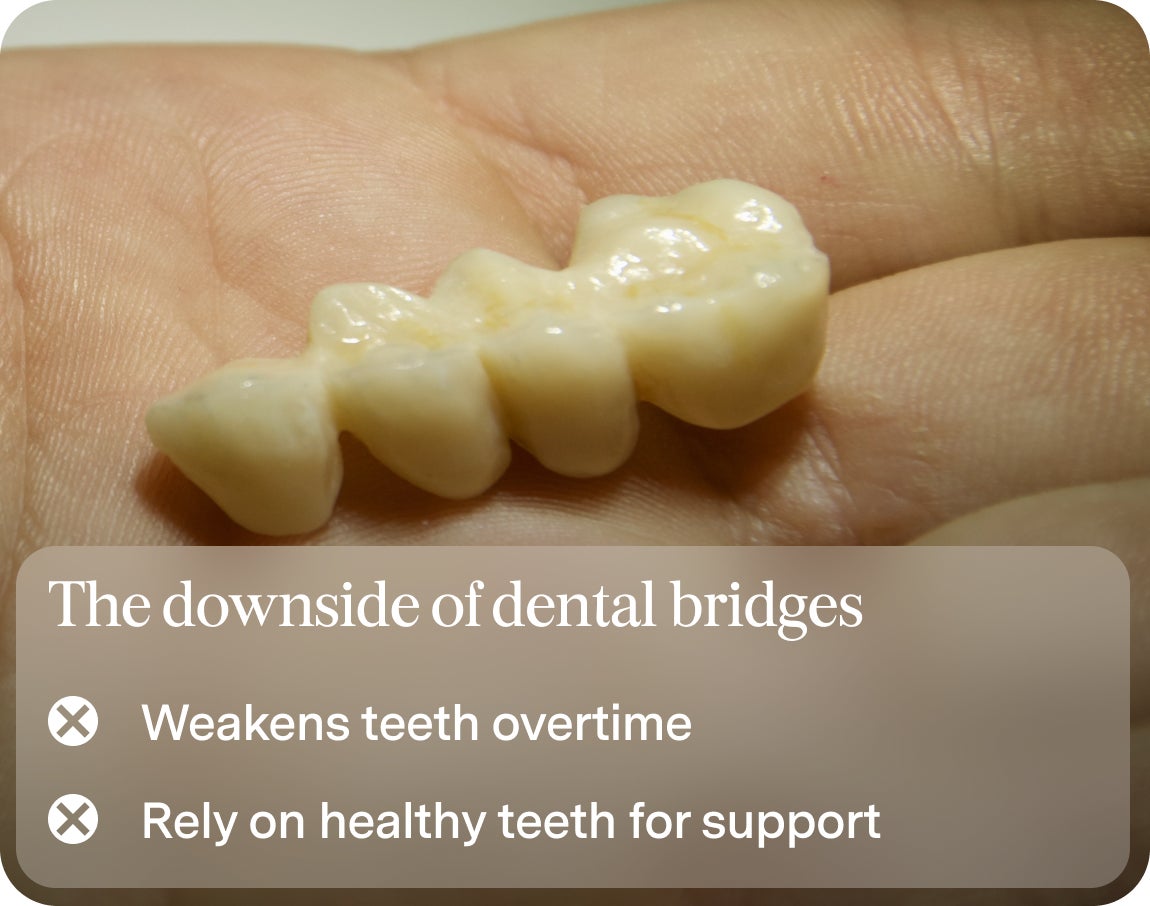Last updated 07.01.2025
Are dental implants worth the investment?
Dental implants offer long-term value. The article compares costs, benefits, and alternatives like dentures and bridges.

When it comes to replacing missing or damaged teeth, many people ask the same question: Are dental implants really worth it? It's a fair question! Implants can be a substantial financial decision. In this blog, we’ll break down why so many patients AND expert ClearChoice® providers consider dental implants a long-term investment in both oral health and quality of life. We'll cover cost, benefits, and how implants compare to other options like dentures or bridges.
What makes dental implants a long-term investment?
Durability and Lifespan of Dental Implants
Dental implants are designed to last. With proper care, they can remain in place for 15 to 25 years—or even longer. Clinical studies show a success rate above 95%¹, making them one of the most reliable solutions available. Compared to alternatives that may need frequent replacements or adjustments, implants offer a low-maintenance path to long-term stability.
¹American Academy of Implant Dentistry - What is the Success Rate of Dental Implants?

Benefits beyond aesthetics: chewing, speech, bone support
While a restored smile is a visible perk, dental implants also bring vital functional benefits. They help patients chew comfortably, speak clearly, and help preserve the bone structure of the jaw, which can deteriorate after tooth loss. These improvements often allow for a wider variety of food choices, which can support better nutrition and overall well-being.
Long-term savings compared to dentures or bridges
Though dentures or implant supported bridges might cost less upfront, they often require periodic repairs, adjustments, or even total replacement. Dental implants, by contrast, are built for longevity, potentially saving money in long-term dental care.
How do dental implants compare to other tooth replacement options?
Dental implants vs dentures: upfront cost vs long-term value
Dentures may seem more affordable initially, but they can shift, cause gum discomfort, or limit the ability to eat certain foods. Dental implants integrate with your jawbone to offer a more secure, natural-feeling fit, resulting in better stability and fewer limitations of function over time.

Dental implants vs bridges: durability, function, and maintenance
Traditional dental bridges rely on adjacent healthy teeth for support, which can weaken these teeth over time. Implants, however, stand alone and do not depend on the adjacent natural teeth to be successful. Single tooth implants are simpler to clean around than dental bridges. They provide bite strength similar to natural teeth and reduce the risk of bone shrinkage of the jawbone often seen with dental bridges.

Why some patients still choose non-implant options
Some patients may not be candidates for implants due to medical conditions, lack of jawbone volume or budget concerns. That’s why ClearChoice offers free consultations to explore the best solution for each unique case.
What factors affect the cost and value of dental implants?
Implant material, number of teeth, and supporting procedures
The cost of dental implant treatment can vary depending on how many teeth need to be replaced, whether additional procedures like bone grafts are required, and the materials that are used to make the teeth. A comprehensive consultation will help outline the total cost and treatment plan specific to your needs.
How long-term maintenance impacts total cost
Unlike dentures or dental bridges, which may require ongoing visits for maintenance, dental implants typically need only routine dental care—another reason they offer lasting value.
Does insurance or financing affect value?
While not all insurance plans cover dental implants, many ClearChoice Centers offer third-party financing options that make treatment more manageable. This can greatly affect the overall value and affordability of care.

How do dental implants improve quality of life?
Improved comfort, chewing, and speech
Implants look, feel, and function like natural teeth, allowing patients to eat their favorite foods again, speak with confidence, and enjoy daily activities without discomfort associated with removable dentures.
Confidence and emotional well-being after implants
Many patients report that implants do more than restore smiles—they restore confidence. Being able to smile, laugh, and socialize freely again has emotional benefits that ripple into all areas of life.
How dental implants impact everyday routines
From brushing and flossing to eating and sleeping, dental implants blend seamlessly into daily routines with none of the slipping of dentures or adhesives required to combat that slipping.
What do real patients say about their dental implant experience?
Success stories from long-term implant patients
ClearChoice patients often describe their journey as life-changing. One patient shared how they could finally enjoy meals with their family again. Another spoke about regaining their confidence after years of hiding their smile.
What patients say about confidence and daily life post-treatment
Patients report greater satisfaction with their appearance and oral function after implant treatment.
Quotes and stats that highlight satisfaction
With over 90% patient satisfaction², it’s clear that dental implants deliver results patients value deeply.
Dental implants are more than a cosmetic fix—they’re a long-term investment in your health, function, and self-confidence. With ClearChoice® Dental Implant Centers, you get a team of experts, a customized treatment plan, and the opportunity to restore what matters most.
²BMC Oral Health - Patient satisfaction and oral health-related quality of life 10 years after implant placement
Schedule free consultation>
Dental implants investment FAQs
How long do dental implants last?
With proper care, many implants last 15–25 years or more.
Can I get dental implants if I have bone loss?
In many cases, yes. Additional procedures like bone grafting can help.
How do dental implants compare to dentures in cost over time?
While the initial cost is higher, implants can save money by avoiding replacements and complications.
Do dental implants help prevent further bone loss?
Yes. Because they stimulate the jawbone, implants can help maintain bone structure.
Are dental implants covered by dental insurance?
ClearChoice does not accept insurance, but we work with third-party financiers to make dental implant treatment more manageable. Your ClearChoice doctor can provide proper documentation after your procedure, so that you might file with your insurance for covered reimbursement, if any.
Is there downtime or recovery time after getting dental implants?
Recovery time varies. It is typically a few days to a week, depending on the treatment provided.
How do I know if implants are the right solution for me?
Scheduling a free consultation is the best way to find out.
What do ClearChoice patients say about their results?
ClearChoice Dental Implant Center patients consistently share how implants have transformed their lives—from function to self-esteem. Explore our reviews and testimonials to learn more.



